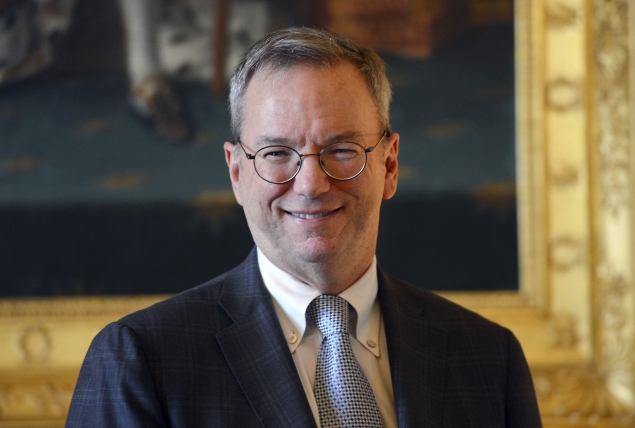- Home
- Mobiles
- Mobiles News
- Chrome OS, Android to remain independent entities: Google's Schmidt
Chrome OS, Android to remain independent entities: Google's Schmidt

Google last week said Andy Rubin, the architect of Android - the world's top-selling mobile operating system - was moving to a still-undefined role while Sundar Pichai, in charge of its Chrome web browser and applications like Google Drive and Gmail, was taking on Rubin's responsibilities.
Schmidt, Google's chief executive from 2001 to 2011, is becoming more outspoken on issues involving technology and world affairs, and was in India as part of a multi-country Asian tour to promote Internet access.
After the Indian capital, he is visiting Myanmar, which is seen as the last virgin territory for businesses in Asia.
In January he went to North Korea, saying it was a personal trip to talk about a free and open Internet.
Only about a tenth of India's more than 1.2 billion people have access to the Internet, although that is changing fast with growth in low-cost tablet computers and cheaper smartphones.
Schmidt called on India to clarify a law that holds so-called intermediaries like Google and Facebook liable for content users post on the web.
In 2011, India passed a law that obliges social media companies to remove a range of objectionable content when requested to do so, a move criticised at the time by human rights groups and companies.
Schmidt also said rumours he may be leaving Google were "completely false." He was responding to a question on whether his plan to sell about 42 percent of his Google stake was a signal that he was leaving the world's No.1 search engine.
"Google is my home," he said, adding that he had no plans to take on a job in government.
© Thomson Reuters 2013
Get your daily dose of tech news, reviews, and insights, in under 80 characters on Gadgets 360 Turbo. Connect with fellow tech lovers on our Forum. Follow us on X, Facebook, WhatsApp, Threads and Google News for instant updates. Catch all the action on our YouTube channel.
Related Stories
- Samsung Galaxy Unpacked 2026
- iPhone 17 Pro Max
- ChatGPT
- iOS 26
- Laptop Under 50000
- Smartwatch Under 10000
- Apple Vision Pro
- Oneplus 12
- OnePlus Nord CE 3 Lite 5G
- iPhone 13
- Xiaomi 14 Pro
- Oppo Find N3
- Tecno Spark Go (2023)
- Realme V30
- Best Phones Under 25000
- Samsung Galaxy S24 Series
- Cryptocurrency
- iQoo 12
- Samsung Galaxy S24 Ultra
- Giottus
- Samsung Galaxy Z Flip 5
- Apple 'Scary Fast'
- Housefull 5
- GoPro Hero 12 Black Review
- Invincible Season 2
- JioGlass
- HD Ready TV
- Latest Mobile Phones
- Compare Phones
- Tecno Pova Curve 2 5G
- Lava Yuva Star 3
- Honor X6d
- OPPO K14x 5G
- Samsung Galaxy F70e 5G
- iQOO 15 Ultra
- OPPO A6v 5G
- OPPO A6i+ 5G
- Asus Vivobook 16 (M1605NAQ)
- Asus Vivobook 15 (2026)
- Brave Ark 2-in-1
- Black Shark Gaming Tablet
- boAt Chrome Iris
- HMD Watch P1
- Haier H5E Series
- Acerpure Nitro Z Series 100-inch QLED TV
- Asus ROG Ally
- Nintendo Switch Lite
- Haier 1.6 Ton 5 Star Inverter Split AC (HSU19G-MZAID5BN-INV)
- Haier 1.6 Ton 5 Star Inverter Split AC (HSU19G-MZAIM5BN-INV)






![[Partner Content] OPPO Reno15 Series: AI Portrait Camera, Popout and First Compact Reno](https://www.gadgets360.com/static/mobile/images/spacer.png)









